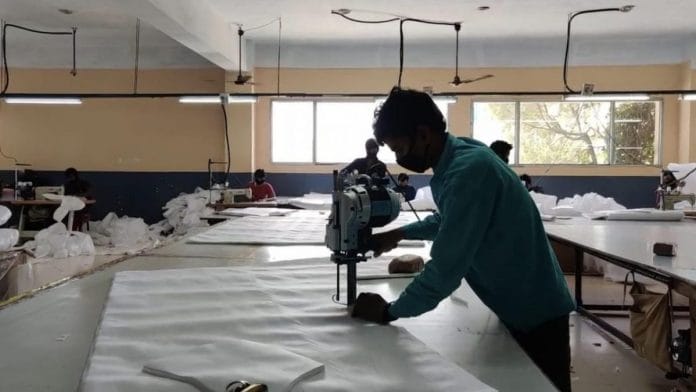New Delhi: To boost the micro, small and medium enterprise (MSME) sector, Union Finance Minister Nirmala Sitharaman Tuesday announced a slew of measures including increasing the limit for Mudra loans and introducing a new credit rating mechanism.
In her speech, Sitharaman said the Budget provides “special attention” to MSMEs and manufacturing, particularly labour-intensive manufacturing, and that the Centre has formulated a package to help MSMEs grow and also compete globally.
A credit guarantee scheme to facilitate term loans for machinery and equipment without collateral or third-party guarantee would be introduced, she said.
Additionally, a separately constituted self-financing guarantee fund would provide a guarantee cover up to Rs 100 crore, while the loan amount might be larger. “The borrower will have to provide an upfront guarantee fee and an annual guarantee fee on the reducing loan balance,” she said.
The Budget also proposed a new assessment model for MSME credit wherein public sector banks (PSBs) would build their in-house capability to assess MSMEs for credit, instead of relying on external assessment.
“They will also take a lead in developing or getting developed a new credit assessment model, based on the scoring of digital footprints of MSMEs in the economy,” Sitharaman said, adding that this is expected to be a significant improvement over the traditional assessment of credit eligibility based only on asset or turnover criteria.
She also announced a new mechanism for facilitating continuation of bank credit to MSMEs during their stress period. “While being in the ‘special mention account’ (SMA) stage for reasons beyond their control, MSMEs need credit to continue their business and to avoid getting into the NPA stage. Credit availability will be supported through a guarantee from a government-promoted fund.”
“Access to credit has been an ongoing issue for MSMEs. Government has been pushing financial institutions towards providing unsecured financing to MSME units. Setting up a credit guarantee fund is a welcome initiative towards institutionalising unsecured financing and to address the issue of access to credit,” Kanishk Maheshwari, Co-Founder & Managing Director at consultancy firm Primus Partners, said.
Further, the Budget proposed to increase the limit of Mudra loans to Rs 20 lakh from Rs 10 lakh for entrepreneurs who availed and successfully repaid previous loans under the ‘Tarun’ category. Tarun is a category of loan under the Pradhan Mantri Mudra Yojana (PMMY) to help small businesses access formal credit. It covers loans between Rs 5 lakh and Rs Rs 10 lakh.
To help MSMEs unlock their working capital by converting trade receivables into cash, the Budget proposes to reduce the turnover threshold of buyers for mandatory onboarding on the TReDS platform — an electronic platform that helps MSMEs in securing financial assistance digitally at competitive terms — from Rs 500 crore to Rs 250 crore.
Financial support for setting up of 50 multi-product food irradiation units in the MSME sector will be provided, according to the Budget.
“Setting up of 100 food quality and safety testing labs with NABL accreditation will be facilitated,” the finance minister said, adding that to enable MSMEs and traditional artisans to sell their products in international markets, E-Commerce Export Hubs will be set up in PPP mode.
Anil Bhardwaj, Secretary General of Federation of Indian Micro Small & Medium Enterprises, welcomed the announcements made in the Budget.
“As underscored in the Economic Survey, the MSME sector is pivotal to India’s economic landscape. These budgetary provisions demonstrate a robust commitment to strengthening and consolidating this crucial sector. By improving access to financial resources, these reforms will empower MSMEs to thrive and make a substantial contribution to economic growth,” he said.
(Edited by Tony Rai)
Also Read: Budget 2024: Rs 1.52 lakh crore for agriculture & allied sectors, emphasis on natural farming






